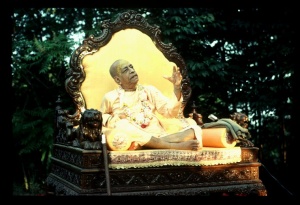CC Madhya 9.123: Difference between revisions
m (1 revision(s)) |
No edit summary |
||
| Line 1: | Line 1: | ||
{{ | [[Category:Sri Caitanya-caritamrta - Madhya-lila Chapter 09|C123]] | ||
<div style="float:left">'''[[Sri Caitanya-caritamrta|Śrī Caitanya-caritāmṛta]] - [[CC Madhya|Madhya-līlā]] - [[CC Madhya 9|Chapter 9: Lord Śrī Caitanya Mahāprabhu's Travels to the Holy Places]]'''</div> | |||
<div style="float:right">[[File:Go-previous.png|link=CC Madhya 9.122|Madhya-līlā 9.122]] '''[[CC Madhya 9.122|Madhya-līlā 9.122]] - [[CC Madhya 9.124|Madhya-līlā 9.124]]''' [[File:Go-next.png|link=CC Madhya 9.124|Madhya-līlā 9.124]]</div> | |||
{{CompareVersions|CC|Madhya 9.123|CC 1975|CC 1996}} | |||
{{RandomImage}} | |||
==== TEXT 123 ==== | ==== TEXT 123 ==== | ||
<div | <div class="verse"> | ||
nibhṛta-marun-mano-’kṣa-dṛḍha-yoga-yujo hṛdi yan- | :nibhṛta-marun-mano-’kṣa-dṛḍha-yoga-yujo hṛdi yan- | ||
munaya upāsate tad arayo ’pi yayuḥ smaraṇāt | :munaya upāsate tad arayo ’pi yayuḥ smaraṇāt | ||
striya uragendra-bhoga-bhuja-daṇḍa-viṣakta-dhiyo | :striya uragendra-bhoga-bhuja-daṇḍa-viṣakta-dhiyo | ||
vayam api te samāḥ samadṛśo ’ṅghri-saroja-sudhāḥ | :vayam api te samāḥ samadṛśo ’ṅghri-saroja-sudhāḥ | ||
</div> | </div> | ||
| Line 14: | Line 18: | ||
==== SYNONYMS ==== | ==== SYNONYMS ==== | ||
<div | <div class="synonyms"> | ||
''nibhṛta''—controlled; ''marut''—the life air; ''manaḥ''—the mind; ''akṣa''—the senses; ''dṛḍha''—strong; ''yoga''—in the mystic ''yoga'' process; ''yujaḥ''—who are engaged; ''hṛdi''—within the heart; ''yat''—who; ''munayaḥ''—the great sages; ''upāsate''—worship; ''tat''—that; ''arayaḥ''—the enemies; ''api''—also; ''yayuḥ''—obtain; ''smaraṇāt''—from remembering; ''striyaḥ''—the ''gopīs''; ''uraga-indra''—of serpents; ''bhoga''—like the bodies; ''bhuja''—the arms; ''daṇḍa''—like rods; ''viṣakta''—fastened to; ''dhiyaḥ''—whose minds; ''vayam api''—we also; ''te''—Your; ''samāḥ''—equal to them; ''sama-dṛśaḥ''—having the same ecstatic emotions; ''aṅghri-saroja''—of the lotus feet; ''sudhāḥ''—the nectar. | |||
</div> | </div> | ||
| Line 21: | Line 25: | ||
==== TRANSLATION ==== | ==== TRANSLATION ==== | ||
<div | <div class="translation"> | ||
“‘Great sages conquer the mind and senses by practicing the mystic yoga system and controlling the breath. Thus engaging in mystic yoga, they see the Supersoul within their hearts and ultimately enter into impersonal Brahman. But even the enemies of the Supreme Personality of Godhead attain that position simply by thinking of the Supreme Lord. However, the damsels of Vraja, the gopīs, being attracted by the beauty of Kṛṣṇa, simply wanted to embrace Him and His arms, which are like serpents. Thus the gopīs ultimately tasted the nectar of the lotus feet of the Lord. Similarly, we Upaniṣads can also taste the nectar of His lotus feet by following in the footsteps of the gopīs.’” | “‘Great sages conquer the mind and senses by practicing the mystic yoga system and controlling the breath. Thus engaging in mystic yoga, they see the Supersoul within their hearts and ultimately enter into impersonal Brahman. But even the enemies of the Supreme Personality of Godhead attain that position simply by thinking of the Supreme Lord. However, the damsels of Vraja, the gopīs, being attracted by the beauty of Kṛṣṇa, simply wanted to embrace Him and His arms, which are like serpents. Thus the gopīs ultimately tasted the nectar of the lotus feet of the Lord. Similarly, we Upaniṣads can also taste the nectar of His lotus feet by following in the footsteps of the gopīs.’” | ||
</div> | </div> | ||
| Line 28: | Line 32: | ||
==== PURPORT ==== | ==== PURPORT ==== | ||
<div | <div class="purport"> | ||
This verse is from Śrīmad-Bhāgavatam ([[SB 10.87.23]]). | This verse is from [[Srimad-Bhagavatam|''Śrīmad-Bhāgavatam'']] ([[SB 10.87.23]]). | ||
</div> | </div> | ||
__NOTOC__ | |||
<div style="float:right; clear:both;">[[File:Go-previous.png|link=CC Madhya 9.122|Madhya-līlā 9.122]] '''[[CC Madhya 9.122|Madhya-līlā 9.122]] - [[CC Madhya 9.124|Madhya-līlā 9.124]]''' [[File:Go-next.png|link=CC Madhya 9.124|Madhya-līlā 9.124]]</div> | |||
__NOTOC__ | |||
__NOEDITSECTION__ | |||
Revision as of 10:03, 24 August 2021

A.C. Bhaktivedanta Swami Prabhupada
TEXT 123
- nibhṛta-marun-mano-’kṣa-dṛḍha-yoga-yujo hṛdi yan-
- munaya upāsate tad arayo ’pi yayuḥ smaraṇāt
- striya uragendra-bhoga-bhuja-daṇḍa-viṣakta-dhiyo
- vayam api te samāḥ samadṛśo ’ṅghri-saroja-sudhāḥ
SYNONYMS
nibhṛta—controlled; marut—the life air; manaḥ—the mind; akṣa—the senses; dṛḍha—strong; yoga—in the mystic yoga process; yujaḥ—who are engaged; hṛdi—within the heart; yat—who; munayaḥ—the great sages; upāsate—worship; tat—that; arayaḥ—the enemies; api—also; yayuḥ—obtain; smaraṇāt—from remembering; striyaḥ—the gopīs; uraga-indra—of serpents; bhoga—like the bodies; bhuja—the arms; daṇḍa—like rods; viṣakta—fastened to; dhiyaḥ—whose minds; vayam api—we also; te—Your; samāḥ—equal to them; sama-dṛśaḥ—having the same ecstatic emotions; aṅghri-saroja—of the lotus feet; sudhāḥ—the nectar.
TRANSLATION
“‘Great sages conquer the mind and senses by practicing the mystic yoga system and controlling the breath. Thus engaging in mystic yoga, they see the Supersoul within their hearts and ultimately enter into impersonal Brahman. But even the enemies of the Supreme Personality of Godhead attain that position simply by thinking of the Supreme Lord. However, the damsels of Vraja, the gopīs, being attracted by the beauty of Kṛṣṇa, simply wanted to embrace Him and His arms, which are like serpents. Thus the gopīs ultimately tasted the nectar of the lotus feet of the Lord. Similarly, we Upaniṣads can also taste the nectar of His lotus feet by following in the footsteps of the gopīs.’”
PURPORT
This verse is from Śrīmad-Bhāgavatam (SB 10.87.23).